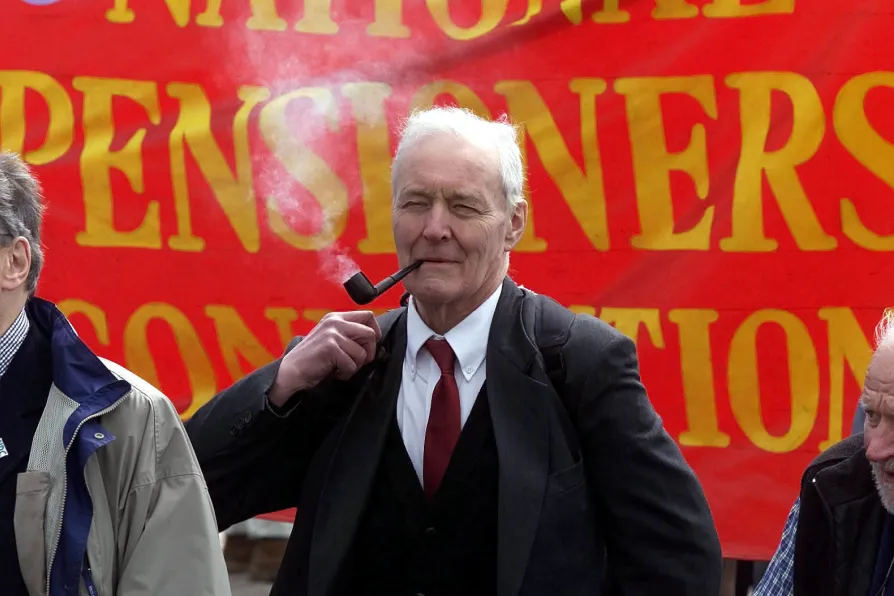John Wojcik pays tribute to a black US activist who spent six decades at the forefront of struggles for voting rights, economic justice and peace – reshaping US politics and inspiring movements worldwide
In 1981, towering figure for the British left Tony Benn came a whisker away from victory, laying the way for a wave of left-wing Labour Party members, MPs and activism — all traces of which are now almost entirely purged by Starmer, writes KEITH FLETT

 Veteran Labour MP Tony Benn, leading over 500 OAPs in a march to mark the start of the three-day National Pensioners Convention in Blackpool's Winter Gardens, April 30, 2001
Veteran Labour MP Tony Benn, leading over 500 OAPs in a march to mark the start of the three-day National Pensioners Convention in Blackpool's Winter Gardens, April 30, 2001
THE tectonic plates of the left are shifting with an election for a Labour deputy leader. In 2025, no left candidate has made the ballot, and the two candidates are Lucy Powell — recently sacked by Keir Starmer as a leader of the House of Commons, who is reportedly “soft left” — and Bridget Phillipson, the Education Secretary.
For the left, it is hardly an inspiring choice, and it represents a very different Labour Party from the 1981 deputy leader election.
The resignation of Angela Rayner started the electoral process to elect a new Labour deputy leader, which will conclude in October. It’s the first time since 1981 that an election only for that position has been held. Normally, the leader and deputy are elected at the same time.
In January 1981, a Labour conference at Wembley had agreed to introduce an electoral college for leader and deputy leader. Previously, only MPs had a vote. Michael Foot, the leader at the 1981 conference, had been the last to be elected by MPs only.
The right had wanted a one-member, one-vote system (to cut the unions out of it). When they lost, many, but not all, left to form the Social Democratic Party.
At the election for deputy leader on Sunday September 27 1981, Tony Benn and Denis Healey were the second-round ballot candidates. Both were political heavyweights with considerable experience of government, Benn on the left, Healey on the right.
The Labour left, which in a sense became the “Bennite left,” mounted an energetic campaign, but the assumption was that Healey would get much of the union vote and win.
Benn recorded in his diary that as he entered the conference hall at 5pm, he was “prepared for a massive defeat.”
In the first-round ballot, Healey got 44.536 per cent, Benn 36.639 per cent and John Silkin 18 per cent. He was eliminated. The T&G union (now part of Unite), which had backed Silkin, switched its vote to Benn.
In the second ballot, Healey got 50.426 per cent while Benn got 49.547 per cent. He lost by 0.8 per cent. Benn noted that he then went off to a rally called by London Labour Briefing.
Benn’s diaries for the period cover the campaign leading up to the ballot in some detail, including the period when he was hospitalised with a nerve-related illness. The campaigning initiative came from the Campaign for Labour Party Democracy. Benn is clear that the aim was to open up the party to significantly more grassroots influence and limit the power of the parliamentary party.
Benn lost, but in doing so laid at least part of the basis for a left-wing presence in the Labour Party sometimes known as “the Bennite wave.” It was in this period that familiar left-wing figures such as Jeremy Corbyn, Diane Abbott, John McDonnell and the late Bernie Grant entered Parliament.
The rules for electing the Labour leader and deputy have been revisited since 1981, with the period of Corbyn’s leadership from 2015 opening up a much wider still membership role.
Under Starmer from 2020, this has gone into significant reverse, with those associated with the left after the 1981 contest now outside of or suspended from the Labour Party.
The historian Gareth Stedman Jones argued in his 1984 essay “Why is the Labour Party in a Mess?” that the party is essentially a framework that is populated by different people, interests and social forces as the generations change.
Comparing the 1981 deputy leadership election to the 2025 one, while the name of the party remains the same, in practice, the left that was so influential then is now to be found primarily elsewhere.
Keith Flett is a socialist historian. Follow him on X @kmflett.









